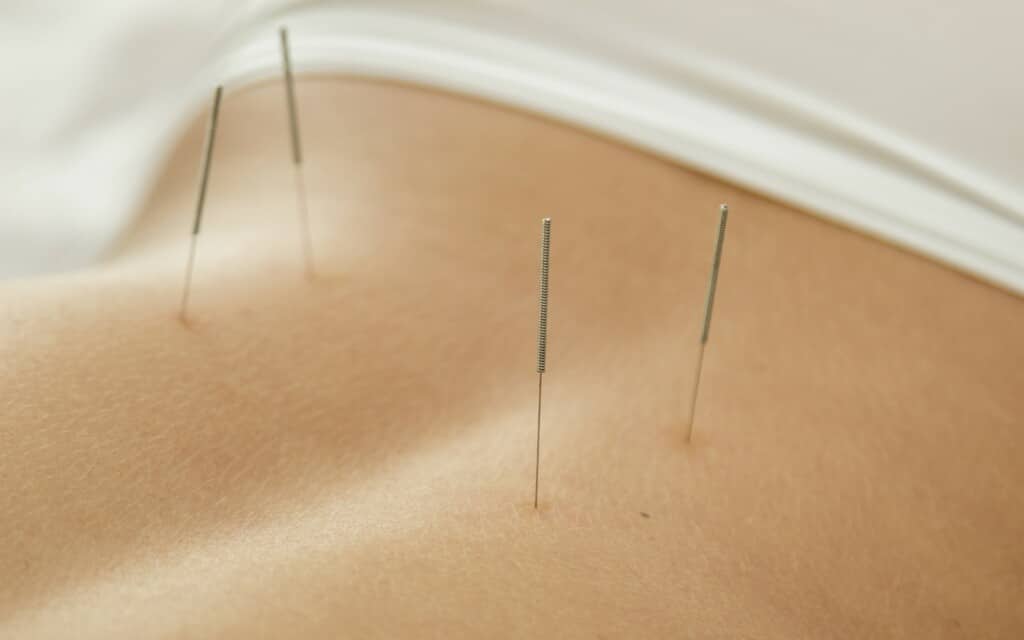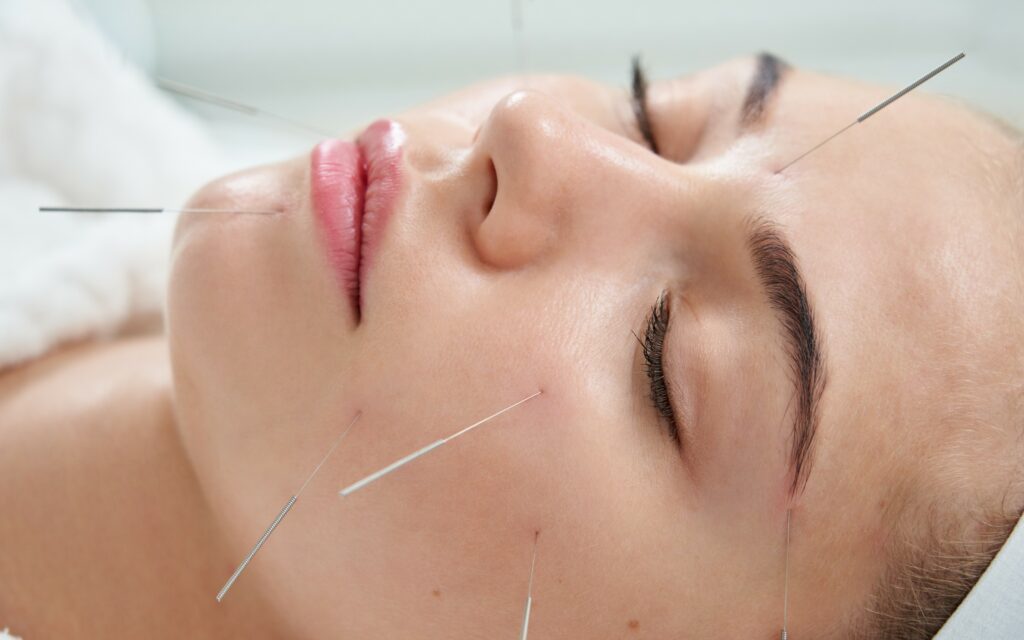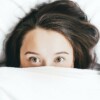Acupuncture could represent one of the most powerful holistic remedies for insomnia. While sleep issues are extremely common in today’s complex and high-octane world, they’re also very difficult to manage. Read on to learn about acupuncture for insomnia and how to use acupressure on yourself at home.
Treatment options like medication and therapy don’t work for everyone. If you’re not getting your recommended 7-9 hours of sleep per night (like 35% of the US), you may consider using some alternative therapeutic methods to reduce your symptoms.
Acupuncture have been proven to help with everything from pain to stress reduction, which makes it ideal for addressing different kinds of insomnia.
As an added bonus, acupuncture has no side-effects or withdrawal issues to consider, unlike the majority of sleeping pills on the market.
Here’s what you need to know about acupuncture and sleep.
Acupuncture for sleep: How does acupuncture work?
To understand the benefits of acupuncture for sleep, we first need to explore what acupuncture is, and what it can do. This holistic treatment method involves inserting thin needles into the skin to stimulate specific areas of the body. The practice goes back centuries, particularly throughout Eastern medicine.
According to experts, acupuncture has proven to be a powerful tool for addressing a range of common concerns. Health practitioners use acupuncture for everything from allergies to depression. It can even assist with pain and chronic discomfort preventing you from getting a good night’s sleep.
A review of 20 studies conducted in 2021 found acupuncture was more likely to improve anxiety than a placebo, while another 2019 study found it was helpful for minimizing pain.
Acupuncture is a practice taken from Chinese medicine, known for considering the spirit, mind and body as an interconnected system. Using important “acupuncture sleep points”, practitioners stimulate the “meridians” or pathways in the body, where energy flows.
From a scientific perspective, acupuncture is a form of neuromodulator, capable of reducing the brain’s perception of sensory signals for stress and pain.

Can acupuncture help with sleep problems?
So, what are the benefits of acupuncture for sleep?
At present, research into acupuncture for sleep issues is limited. Albeit, a handful of studies emerging around the world have shown positive results. Perhaps most importantly, acupuncture is considered to be a safe and effective treatment for sleep issues.
Compared to other treatments like medication, there are no withdrawal or dependence issues associated with acupuncture, and most people respond positively to the treatment.
A review of 46 controlled trials found acupuncture was actually better at improving sleep quality than drugs, and more effective at improving total sleep duration.
While more research needs to be done, many patients suffering from insomnia see benefits from acupuncture. One 2017 studyinvolved researchers giving either “traditional” or “sham” acupuncture to people with sleeping disorders.
Sham acupuncture involves only inserting needles slightly into the skin, rather than addressing key pressure points. Researchers found the genuine acupuncture improved sleep efficiency and total sleep time, while reducing anxiety symptoms.
Another double-blind study conducted in 2013 looking at 180 people found traditional acupuncture was more effective at improving daytime functioning and sleep quality than sedative medication or “sham” acupuncture.
How long does it take for acupuncture to work for insomnia?
Insomnia and sleep issues are highly complex. Different people respond in unique ways to treatments. As such, it’s difficult to know for certain when anyone will begin to experience results. However, most researchers say acupuncture has a “cumulative” effect.
This means the best way to enhance the results of acupuncture is to ensure you commit to regular treatment and appointments. Usually, treatments given weekly for between 4 to 6 weeks will deliver the best level of progression.
Notably, acupuncture isn’t only effective at dealing with primary and general insomnia. Researchers looking into the potential of acupuncture for sleep have found significant benefits for other patients too.
For instance, a review of 9 studies conducted in 2020 found acupuncture significantly improved OSA symptoms (Obstructive Sleep Apnea), as well as oxygen saturation levels.
A similar review in 2016 also shared these conclusions, indicating acupuncture might be useful for those suffering with sleep apnea too. However, it may take longer to see results. You may need to consider additional forms of treatment at the same time, like CPAP machines.
Acupuncture can also help with the mental health disorders more likely to make insomnia and sleep conditions unbearable. A study of 90 people with depression conducted in 2020 found acupuncture delivered with electric voltage improved sleep quality, efficiency, and total sleep time, while also reducing depression symptoms.
Is there a pressure point to make you sleep?
For people who aren’t comfortable seeking out acupuncture, there are various other ways to use similar pressure-point focused treatments to improve your sleep pattern. For instance, it’s possible to manipulate pressure points at home to help the body relax.
Chinese medicine also uses pressure on acupoints, and massage to restore balance and improve the flow of energy. Similar to acupuncture, these methods, known as “acupressure”, have also been shown to positively influence sleep quality.
While it’s possible to seek out professional treatment via acupressure, there are also methods for using this strategy at home.
When stimulating your pressure points, it’s important to be comfortable and relaxed. Take deep breaths, and apply firm pressure to certain points in the body, such as the:
Spirit gate
Otherwise known as the “Shenmen”, this point is most commonly used by acupressure therapists for insomnia and sleep disorders. There are two spirit gate points in the body, within the ear, and in the wrist. The easiest one to use yourself is on your wrist, located just towards the edge of the hand, near the pinkie finger.
Hundred meetings
The Baihui, or hundred meetings pressure point is one of the other most common acupuncture sleep points used in acupressure. This is located within the highest point of the head, centred between the tips of the ears. You can massage this point of your head when going to sleep to improve your chances of a good night’s sleep.
Gushing spring
Otherwise known as Yongquan, this acupressure point is located at the bottom of the foot, within the center of the sole. When your toles are curled, you’ll be able to track the yongquan point within the small dip that appears just above the middle of your foot. Deep massage here is excellent for improving sleep.
Some people find it helpful to combine acupressure and acupuncture to generate the best possible benefits from their holistic insomnia treatments. However, more studies are needed to demonstrate the advantages of this specific form of massage.

Tips for people using acupuncture for insomnia
If you’re planning on using acupuncture for sleep or acupressure for sleep, it’s important to note there are other valuable steps you can take to improve your chances of a good night’s rest. Aside from stimulating the right pressure points, finding time to relax and unwind before bed is often useful.
While a massage can be an excellent way to boost relaxation and leverage the benefits of acupressure at the same time, multiple other strategies can also help. You can try reading or meditating or drinking a cup of herbal tea to soothe your nerves.
It’s also important to ensure your bedroom is set up for a good night’s sleep. This means ensuring you have a comfortable mattress, and the room itself isn’t too warm.
Blocking out sunlight, sound and other distractions can assist you in avoiding insomnia. Don’t forget to consider the standard sleep hygiene practices recommended by experts too, such as:
- Creating a peaceful environment with a white sound machine or aromatherapy machine.
- Keeping your bedroom reserved for sleep and sex only and removing any entertainment options like televisions and music players.
- Exercising regularly so you can remove excess stress from your body and feel sleepier when you’re ready to go to bed.
- Taking a hot bath or shower to relax your muscles and ease any pain you might feel.
- Avoiding anything stressful before bed, like intense conversations or checking social media.
You can also look into alternative methods of therapy similar to acupuncture, like reflexology, which involves applying certain amounts of pressure to the ears, hands, and feet.
You can also look into cupping therapy, or ear seeds which stimulate the points in the ears and effective at encouraging a good night’s rest. Speak to your doctor before trying any therapeutic methods.
The link between acupuncture and sleep
Using acupuncture for sleep might not work well for everyone. Generally, people find this form of pressure manipulation is an excellent way to reduce stress, anxiety, and pain. As these are some of the most common causes of insomnia, it makes sense acupuncture would help with sleep too.
However, if you are seeking out acupuncture treatment, it’s important to ensure you’re a suitable candidate by speaking to your doctor first. It’s also worth making sure you find the right practitioner to help you make the most of your treatment.
Siestio. Sleep Matters.
Now read these:
—Aromatherapy for sleep and relaxation
—Homeopathic medicine for insomnia
—How to use calming crystals for sleep
Medical disclaimer
You must not rely on the information provided on our website as an alternative to medical advice from your doctor or other healthcare professionals. For more information read our full disclaimer here.







